 Milk (2008)Year: 2008
Milk (2008)Year: 2008
Genre: Drama, Biography
Rating: 8.0/10
Director: Gus Van Sant
Duration: 128 min
Country: USA
Actors: Sean Penn, Emile Hirsch, Josh Brolin, James Franco, Diego Luna, Alison Pill, Lucas Grabeel, Victor Garber, Denis O'Hare, Joseph Cross, Howard Rosenman, Brandon Boyce, Kelvin Yu, Stephen Spinella, Ted Jan RobertsDa nisam pogledao vjesti na B92 ne bih ni znao da na ovom blogu nema ovog filma. ranije sam o ovom filmu pisao na sajtu koji je na žalost ugašen antigay rukovodstvom ning.com.
Diskriminacija dakle postoji i kod njih "tamo" A o kakvoj se diskriminaciji radi kod nas, pogledajte nasviježiji primjer iz Sava centra u Beogradu:
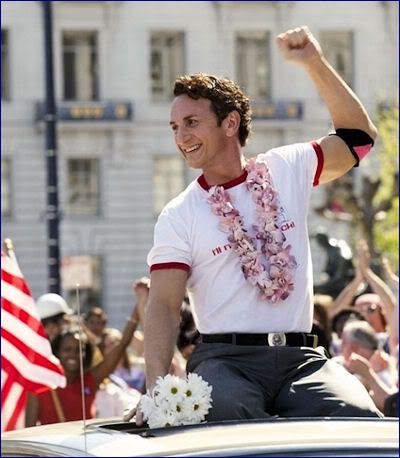
Razumijem mnoge koji nemaju hrabrosti da se suprostave ovakvim diskriminatorskim ponašanjem jer se boje za svoju egzistenciju! Postoje načini i za takve ljude da se ipak suprostave širenju homofobije u društvu. Jedan od njih je i ovaj blog! Ima mnogo sajtova slične sadržine pa dajte svoj komentar i glas za očuvanje osnovnih ljudskih prava! Svaka ćast ovima iz Gay Alijanse!
A oni koji se ipak ne smiju javno pojavljivati na sličnim skupovima mogu se boriti malo glasnije protiv svih vidova diskriminacije, jer nisu samo homofobičari zlikovci koji ugrožavaju ljude koji su drugačije vjeroispovjesti, rase, seksualne orjentacije isl
Imamo regularne parlamentarne izbore, pa treba pratiti koji su to ljudi koji direktno ugrožavaju osnovna ljudska prava! Za njih
nemojte glasati. Jedino tako će te doprinijeti da se takav ološ više ne pojavljuje u prlamentu i utiču na društvo u cjelini!
A kako ko komentariše u Srbiji pogledajte ovde:
http://www.b92.net/info/vesti/index.php?yyyy=2009&mm=02&dd=25&nav_id=346940Kako se svojevremeno glasalo i borilo za ljudska prava u Americi pogledajte u filmu Milk!
VARIETY.COM
By TODD MCCARTHY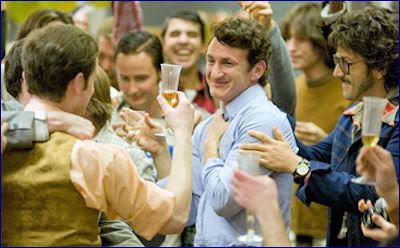
After five years spent working on the more experimental fringe, Gus Van Sant fluently returns to the relative mainstream with “Milk,” an adroitly and tenderly observed account of the life of Harvey Milk, the first openly gay man voted into significant U.S. public office. Smartly handled study of the San Francisco politician’s powerful effect on individuals and society accurately catches a moment in American political life three decades ago, but is most notable for the surprising and entirely winning performance by Sean Penn in the leading role. Almost the definition of a specialized audience film, this Focus release looks to perform strongly in urban and university-adjacent areas but will have trouble crossing over to a public not into gay, political and social-vanguard issues. Commentators will not fail to note certain parallels with the current political season, encapsulated by its hero’s parting line, “You gotta give ‘em hope.”
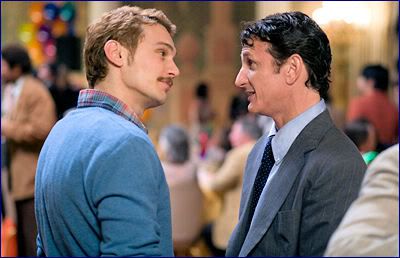
Van Sant has always gravitated toward transgressive outcast characters, and none of them traveled so far from the margins into the status quo, or had such convulsive impact, as the real-life Harvey Milk, a New Yorker who, at 40, moved to San Francisco and broke down a significant sociopolitical barrier before being assassinated by a disturbed fellow politician. The normalizing demands of the biopic genre necessarily squeeze the director into a more recognizable format than he has employed since at least “Finding Forrester” eight years ago, and it’s possible that the most ardent fans of his variously beautiful and aggravating subsequent works -- “Gerry,” “Elephant,” “Last Days” and “Paranoid Park” -- will find this one too conventional.
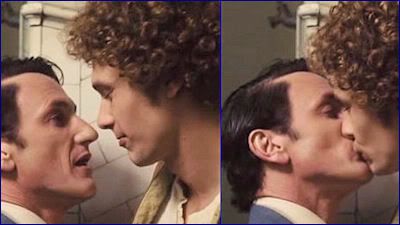
But while “Milk” is unquestionably marked by many mandatory scenes -- the electioneering, outrage at conservative opposition, tension between domestic and public life, insider politicking, public demonstrations, et al. -- the quality of the writing, acting and directing generally invests them with the feel of real life and credible personal interchange, rather than of scripted stops along the way from aspiration to triumph to tragedy. And on a project whose greatest danger lay in its potential to come across as agenda-driven agitprop, the filmmakers have crucially infused the story with qualities in very short supply today -- gentleness and a humane embrace of all its characters, even of the entirely vilifiable gunman, Dan White.
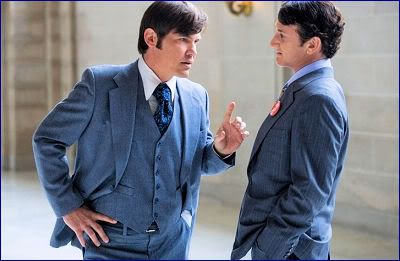
Enormously researched script by Dustin Lance Black (“Big Love,” the indie feature “Pedro”) begins in November 1978, with Milk presciently tape-recording some personal reflections, driven by the awareness that he could easily become the victim of a political assassination, which he in fact was later that month. “Almost everything I did was with an eye on the gay movement,” he admits, and so it is when, in jumping back to 1972, Harvey moves with b.f. Scott Smith (a frizzy-haired, sweet-smiling James Franco) from Gotham to Baghdad by the Bay, determined to do something meaningful with his hitherto uneventful life. The opening stretch fleetly documents the role Harvey and a small group of gay buds, who hung out at Harvey’s Castro Camera shop, played in transforming the Castro district from an unremarkable working-class neighborhood into the gay Mecca it shortly became.
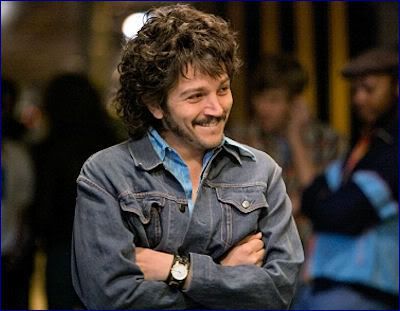
The banter flies easily among these bright young men, who form the nucleus of Harvey’s activist political organization when he runs for office and loses three times, twice for the San Francisco Board of Supervisors and once for California State Assembly. Warm but boldly assertive at all times, Harvey builds a strong support system in the Castro, becomes allied with new S.F. Mayor George Moscone (Victor Garber) and, against the backdrop of propagandist singer Anita Bryant’s campaigns to repeal gay rights in Florida and elsewhere, takes advantage of new city redistricting to finally win a seat on the Board of Supervisors in 1977.
At this point and beyond, especially during the fight against the attempt by California State Senator John Briggs (Denis O’Hare) to ban gays from teaching in public schools, the film does become overweighted by real and re-created TV reports and docu-like material (actual homemovies and vintage reportage are fluidly mixed with newly shot footage throughout) and rooted in specific issues at the expense of the personal.
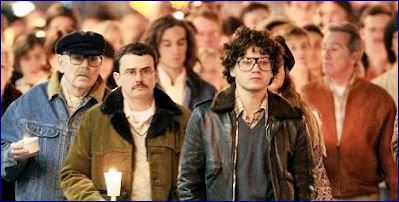
In fact, the pic’s least satisfactory interludes are devoted to Harvey’s last important lover, Jack Lira (Diego Luna), a footloose young Mexican who never comfortably coexists with the long-established inner circle. One can surmise there was a strong sexual bond that kept them together, but as Jack increasingly complains about his partner’s busy schedule, he quickly becomes an annoying character, the only person who creates a drag on Harvey’s energy and focus. More insight into this needy, immature fellow would have helped.
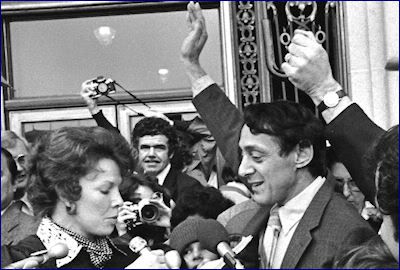
By contrast, another street kid picked up by Harvey, the amusingly brash Cleve Jones (Emile Hirsch), proves a constantly vibrant presence as he evolves into a crucial ally and movement leader. The lone woman of consequence, “tough dyke” Anne Kronenberg (Alison Pill), comes aboard to run the successful fourth campaign, while resistance to Harvey’s upfront style is unexpectedly provided by the Advocate publisher David Goodstein (Zvi Howard Rosenman).
But the most surprising, and suggestively inflected, exchanges occur between Harvey and his eventual killer. The city supervisor from a traditional working class district, clean-cut jock Dan White (Josh Brolin) seems distinctly uncomfortable around Harvey; his knee-jerk impulse is to coldly rebuff him, and he believes his Catholicism, and the disposition of his constituents, requires him to counteract Harvey’s gay agenda.

But he is at other times remarkably solicitous, inviting only Harvey, among all the other supervisors, to his son’s christening, and indulging in political horsetrading with his erstwhile opponent (“I think he may be one of us,” Harvey winks to one of his cronies). The pic reveals Harvey’s own unwittingly fateful betrayals of Dan.
But arguably the film’s best scene is between Harvey and Dan in an otherwise empty foyer; an inarticulate plea for understanding in the form of a drunken rant by Dan, the exchange oozes a complicit vibe between the two men, all but confirming Harvey’s earlier suspicions. Brolin’s work is superlatively expressive of the inchoate impulses roiling inside his sorry character.

But good as most of the cast is, the show belongs squarely to Penn. Made to more closely resemble Milk via an elongated nose, which also makes his face look narrower, the actor socks over his characterization of a man he’s made to seem, above all, a really sweet guy, but who crucially possessed the fearlessness and toughness to be a highly successful political motivator, agitator and, ultimately, figurehead of a movement. Penn’s Harvey is a man with a ready laugh, alive to the moment, open to life regardless of neuroses and past tragedies, and acutely aware of one’s limited time on Earth. The explosive anger and fury often summoned by Penn in his work is nowhere to be seen, replaced by a geniality that is as welcome as it is unexpected.

Penn is also an ideal conduit for a characteristic shrewdly underlined in Black’s writing, that being Harvey’s talent for gently but firmly nudging people out of routine or complacent attitudes. Harvey knows how to tweak others with lightly provocative or stimulating comments that break the ice, and Penn lays on just the right amount of casual innuendo to make this crucial personality trait convincing.
Re-dressed to assume its more humdrum look of 30-plus years ago, the Castro represents itself with absolute authenticity; even Castro Camera has been re-created in the precise storefront location it occupied at the time. If anything, Van Sant and his team, including cinematographer Harris Savides, who so strikingly helped David Fincher evoke the same city and general era in “Zodiac,” have downplayed ostentatious period manifestations in costuming, production design and music in a bid to make a naturalistic film with a lived-in look.

 Nismo mi šveđani ni po mentalitetu ni po ponašanju! Pa zamislite jadno dijete u tom okruženju. U školi bi mu se rugali tate su ti pederi, komšije bi ga gledale kao jadnog bolesnika koga su roditelji zarazili pederizmom, a " roditelji" bi nemoćno svo to posmatrali.
Nismo mi šveđani ni po mentalitetu ni po ponašanju! Pa zamislite jadno dijete u tom okruženju. U školi bi mu se rugali tate su ti pederi, komšije bi ga gledale kao jadnog bolesnika koga su roditelji zarazili pederizmom, a " roditelji" bi nemoćno svo to posmatrali. Jedan moj drug mi je jednom prilikom rekao : Ja bih sve te pedere jebao , ne bi ima palo na pamet da usvajaju djecu i prave brakove! ( treba li napomenuti da je str8) Ja mu odgovorih, sve je to u redu, al pazi de ne zatrudne! Naravno on pojma nema o meni i samo smo se nasmijali!
Jedan moj drug mi je jednom prilikom rekao : Ja bih sve te pedere jebao , ne bi ima palo na pamet da usvajaju djecu i prave brakove! ( treba li napomenuti da je str8) Ja mu odgovorih, sve je to u redu, al pazi de ne zatrudne! Naravno on pojma nema o meni i samo smo se nasmijali! A charming and ultimately uplifting film with affecting scenes, humorously awkward moments, and a serious subtext. Nuanced and believable acting by Gustaf Skarsgĺrd and Torkel Petersson as the married couple at the center of the story; the homosexual relationship is handled in a straightforward and skillful manner. There is a scene involving a policeman and a safety zone that elicits laughter but feels contrived. Patrik Age 1.5 is predictable in terms of where it is going, but it is one of those films in which the journey—not the destination—is what matters.
A charming and ultimately uplifting film with affecting scenes, humorously awkward moments, and a serious subtext. Nuanced and believable acting by Gustaf Skarsgĺrd and Torkel Petersson as the married couple at the center of the story; the homosexual relationship is handled in a straightforward and skillful manner. There is a scene involving a policeman and a safety zone that elicits laughter but feels contrived. Patrik Age 1.5 is predictable in terms of where it is going, but it is one of those films in which the journey—not the destination—is what matters. I saw this last month at the 2009 Palm Springs International Film Festival. Based on a play by Michael Drucker and adapted for the screen by writer/director Ella Lemhagen this is the story of a gay couple living in white picket fence suburban neighborhood run by a homeowners association and populated by an all straight community. Goran Skoogh (Gustaf Skarsgard) and Sven Skoogh (Torkel Petersson)ave taken a singular surname, complete with wedding rings and a marriage but they want to adopt and raise an infant child to round out their marriage and live as a family.
I saw this last month at the 2009 Palm Springs International Film Festival. Based on a play by Michael Drucker and adapted for the screen by writer/director Ella Lemhagen this is the story of a gay couple living in white picket fence suburban neighborhood run by a homeowners association and populated by an all straight community. Goran Skoogh (Gustaf Skarsgard) and Sven Skoogh (Torkel Petersson)ave taken a singular surname, complete with wedding rings and a marriage but they want to adopt and raise an infant child to round out their marriage and live as a family. They have been put on a long waiting list to find a child they can raise from a baby and finally one becomes available. Or so it seems. A typing error that should have read Patrik, age 15 has been mistyped by the social service agency as Patrik 1,5. Believing they are about to bring into their lives an year and half old infant they are shocked to discover their baby is actually 15 years old, homophobic and with a history of delinquency and violence. Sven was once in a straight relationship and has an ex wife and a teenage daughter. He is hesitant of raising any child again let alone a ready-made troubled teenager. Goran wants a baby desperately but can see the good and discovers he can help bring out the good in Patrik (Thomas Ljungman). Nice cinematography from Marek Wiesner and production design from Lene Willumsen which give the film a rich textured look. It's a good cast withe some interesting peripheral characters. It's not an edgy film but is light and humorous with a some touches of drama without coming across as a message movie and it has an appeal to a general audience. I liked it and would give it an 8.5 and recommend it.
They have been put on a long waiting list to find a child they can raise from a baby and finally one becomes available. Or so it seems. A typing error that should have read Patrik, age 15 has been mistyped by the social service agency as Patrik 1,5. Believing they are about to bring into their lives an year and half old infant they are shocked to discover their baby is actually 15 years old, homophobic and with a history of delinquency and violence. Sven was once in a straight relationship and has an ex wife and a teenage daughter. He is hesitant of raising any child again let alone a ready-made troubled teenager. Goran wants a baby desperately but can see the good and discovers he can help bring out the good in Patrik (Thomas Ljungman). Nice cinematography from Marek Wiesner and production design from Lene Willumsen which give the film a rich textured look. It's a good cast withe some interesting peripheral characters. It's not an edgy film but is light and humorous with a some touches of drama without coming across as a message movie and it has an appeal to a general audience. I liked it and would give it an 8.5 and recommend it.
.jpg) Laundromat (2008)
Laundromat (2008) Često nam je potrebno da nam neko otvori oči kako bi u sred šume ugledali drveće. Dešava li vam se da se svađate sa nekim zbog nekih banalnih razloga koji većini ljudi mogu biti smješni. Ljudi se često svađaju zbog različitog razumjevanja riječi i načina na koji ih upotrebljavaju.
Često nam je potrebno da nam neko otvori oči kako bi u sred šume ugledali drveće. Dešava li vam se da se svađate sa nekim zbog nekih banalnih razloga koji većini ljudi mogu biti smješni. Ljudi se često svađaju zbog različitog razumjevanja riječi i načina na koji ih upotrebljavaju.











































